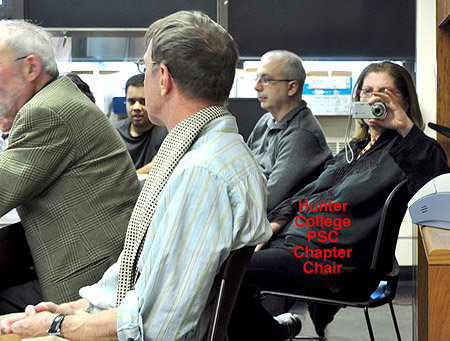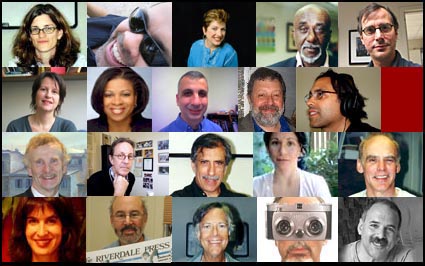
D:F/M Colleague Tami Gold, AKA Hunter College PSC Chapter Chair, (seen above trying to intimidate a Colleague at a department meeting with her teenie-weenie camera in video mode, according to her comment at the time) has been relentless, by any means necessary, in her pursuit of sullying the image, exposing the faults and omissions, real or imaginary, of Hunter College President Jennifer Raab.
Gold is Professional Staff Congress President Barbara Bowen’s single-focused pit bull targeting Jennifer Raab, who, a while back, was limned in New York Times and Chronicle of Higher Education news accounts as a bully-of-sorts.
[NOTE THIS BRIEF DIGRESSION: Gold has yet to do anything remotely remedial about the bullying and Academic Freedom transgressions that have take place in the Department of Film and Media Studies. She also has a track record for supporting or participating in efforts to censure publishing of the WORD. ]
One could almost rhapsodize about the campus sturm ind drang of GOLD vs. RAAB as Godzilla vs. Mechagodzilla. The latest communiqué via PSC Chapter Chair Tami Gold concerns a lawsuit filed by a former non-tenured professor Noel L. Goddard. It was posted on Hunter-L by Gold and also disseminated by hunterpsccuny3@gmail.com. It is old news in a new news wrapping.
One more matter regarding Colleague Tami Gold: This site will be exploring her alleged role in a phony Violence in the Workplace Complaint filed with reckless calumny against a Colleague. What follows is Noel L. Goddard’s letter to the editor of the Chronicle of Higher Education.
‘I Will Not Allow My Academic Reputation to Be Further Slandered’
Correspondence from Chronicle readers.
http://chronicle.com/blogs/letters/i-will-not-allow-my-academic-reputation-to-be-further-slandered/To the Editor:
“Hunter College’s Chief Remains a Lightning Rod” (The Chronicle, July 11, 2013) reported on the controversial management tactics of Hunter College’s president, Jennifer Raab, that lead to the resignation of a number of key senior personnel and the unprecedented turnover of senior staff in the 12 years she has served as president. Two related articles addressed my dismissal from Hunter College’s physics faculty and the legal action I filed against the City University of New York in July 2013 (“Hunter College’s President Split with Senior Officer Got Personal,” <http://chronicle.com/article/Hunter-College-Presidents/141131/> August 15, 2013, and “N.Y. Court Dismisses Complaint of Meddling by Hunter College Chief,” <http://chronicle.com/article/NY-Court-Dismisses-Complaint/144037/> January 15). These articles were published without my commentary due to concerns about ongoing legal procedures.
First and foremost, I want to make it clear my legal action against CUNY concerns an annual reappointment decision, not a tenure decision. The legal complaint and supporting documentation clearly show that Ms. Raab inappropriately directed the outcome of the appeal, both before and after her so-called “recusal.”
In her aggressive and sarcastic letter (“Facts in Hunter College Decision Are ‘Incontrovertible,’ President Says,” <http://chronicle.com/blogs/letters/facts-in-hunter-college-decision-are-incontrovertible-president-says/> August 16, 2013), Ms. Raab claimed the facts in my case were “incontrovertible.” Actually “the facts” have never been discussed. I am the author of 21 publications with almost 800 citations. Seven of these publications were the result of my six years of research at Hunter College. My citation record surpasses that of the recently tenured department chair who denied my reappointment, and my number of publications exceeds research faculty recently tenured in other science departments at Hunter.
While it is true that I had not obtained a major federally funded grant, I successfully acquired small pilot grants to fund preliminary studies for larger applications. When those were insufficient, I purchased research supplies out-of-pocket to continue our studies and the training of my students. As for departmental “standards,” I was shocked to learn at the time of my appeal that the entire physics faculty have obtained only two National Science Foundation grants of that magnitude in the past 10 years!
In addition to my scholarly accomplishments, I consistently received excellent teaching evaluations. I developed the college’s biophysics program, which doubled the department’s enrollment of physics majors. My record of mentorship and service is exceptional, having served as a mentor in many of the outreach and diversity programs at Hunter College as well as local public high schools. Of the 30 students who were personally mentored in my laboratory, 25 continued to PhD, teaching, or professional programs (MD, DVM, DDS, JD, MA/MS). I served on numerous committees across the college, and freely gave my time to lecture at outreach and recruiting events. In short—an exemplary record that would be rewarded at most colleges. Despite these accomplishments, my department began to fill my personnel folder with negative evaluations, suggesting significant bias.
To make the situation even more absurd, no written “standard” for reappointment even exists. In fact, the standards for tenure were only recently written by an acting department chair, Leon Cohen, in March of 2012. How convenient! Not only was he the sole author, but he refused to amend the document despite numerous objections from other senior faculty, emphatically stating at the faculty meeting, “This is what the president wants!”
Finally, in your January 15 article, you reported that I had lost the legal action due to my failure to grieve. The decision was based on a procedural technicality, not the merits of the case. I have appealed the court’s decision. The court dismissed my petition when it granted CUNY’s motion to dismiss, claiming that I did not exhaust my administrative remedies by grieving the decision.
The grievance process is a much more complicated procedure than has been briefly described in the press. Two parallel procedures exist for appealing a department’s decision to deny reappointment. One pathway falls under the collective-bargaining agreement, whereby a faculty member files a grievance through the union. The other process is the college-specific appeals procedure presented to a series of hierarchical committees. A grievance can only be filed against the “reasons letter” accompanying the final decision of the president (the last stage of the appeal). Normally, the union grieves a president’s decision to the chancellor. In September of 2012, Ms. Raab met with me to explain that she had met with the chancellor, who approved her request to recuse herself from my case. The union objected to the precedent of allowing the president’s “recusal.” Feeling abandoned by the union and aware of the deadline for completion of the college’s appeals process, I had no choice but to proceed through the college’s appeals process to defend my academic reputation.
I won the first stage of the appeal to the Division of Math and Sciences, overturning the department’s decision. Although I lost the next stage of the college appeal to the full committee of faculty chairs, this stage was subject to a significant procedural error. Although my chair was allowed to speak freely at the proceedings, my defense package was not made available to voting members prior to their vote! To remedy the error, the college’s counsel decided to hold a revote weeks later, only making the package available to faculty who came, in person, to the dean’s office to read the personnel file. While this may be allowed under their procedural guidelines, it is hardly a fair hearing.
I appealed the faculty’s decision to the former chancellor, Matthew Goldstein. He made the decision to deny my reappointment without the courtesy of a single interview to review my record. I also requested an independent investigation of the appeals process because of my concerns regarding the president’s interference.
That too, went unanswered. His office provided the reasons letter for my dismissal in February of 2013—long past the deadline defined in the contract for the grievance procedure.
CUNY made a motion to dismiss the Article 78 based on my failure to grieve. By contract, even if the union abandons the process, I was allowed to grieve through an independent arbitrator. The arbitrator does not have the power to overturn a college’s academic decision. If awarded the grievance, my case would have been returned to the same faculty who already voted for my dismissal. Hence the independent grievance procedure was futile (as claimed in our response to the motion).
I was motivated to file the Article 78 to shed light on the unacceptable interference of Ms. Raab in the appeals process. This has caused irreparable damage to my career, and I will not allow my academic reputation to be further slandered.
Noel L. Goddard
CEO, Goddard Labs
Stony Brook University Business Incubator
Calverton, N.Y.
Bullying is a treasured tradition in the Department of Film and Media Studies at Hunter College.

Gregg Morris, editor of the WORD and this site.
Tags: Academic Bullying, Andrew Lund, Arnold Gibbons, Babara Bowen, Bernard Stein, Billy d Herman, campus bullying, Carolyn Kane, Chronicle of Higher Education, Greggory w Morris, Gustavo Mercado, Hunter College PSC Chapter Chair, Isabel c Pinedo, Ivone Margulies, James Roman, Joe McElhaney, Joel Zuker, Karen Hunter, Kelly Anderson, Larry Shore, Martin Lucas, Mick Hurbis-Cherrier, New York Healthy Workplace Advocates, Noel L. Goddard, Peter Parisi, PSC President, Ricardo Miranda, Robert Stanley, S3863/A4965 – The NYS Healthy Workplace Bill, Shanti k Thakur, Steve Gorelick, Stuart Ewen, Tami Gold, Timothy Portlock, workplace bullying
